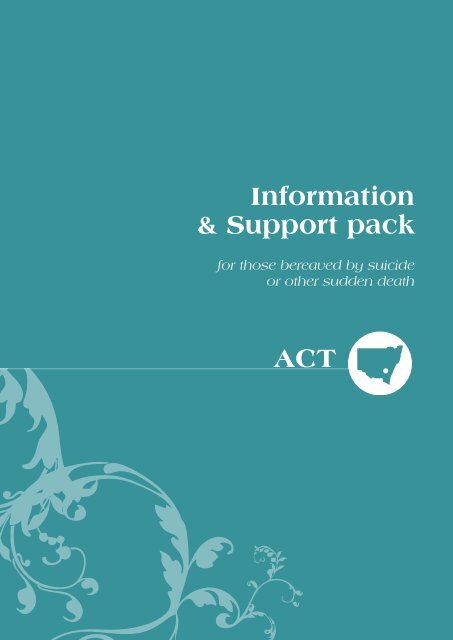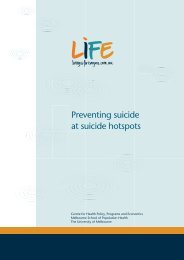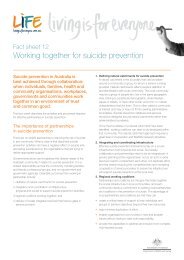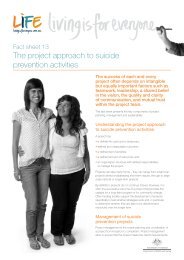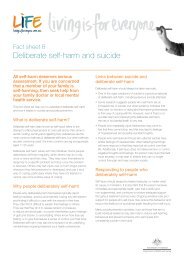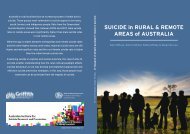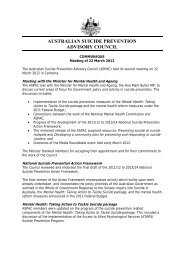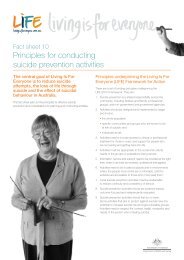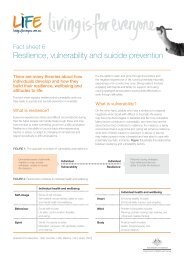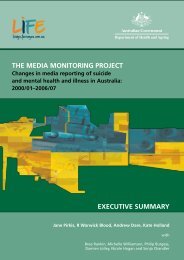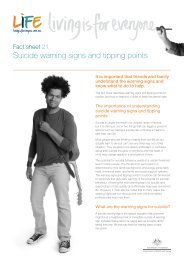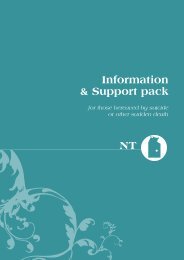Information & Support pack ACT - Living is for Everyone
Information & Support pack ACT - Living is for Everyone
Information & Support pack ACT - Living is for Everyone
Create successful ePaper yourself
Turn your PDF publications into a flip-book with our unique Google optimized e-Paper software.
<strong>In<strong>for</strong>mation</strong>& <strong>Support</strong> <strong>pack</strong><strong>for</strong> those bereaved by suicideor other sudden death<strong>ACT</strong>
<strong>In<strong>for</strong>mation</strong> & <strong>Support</strong> Pack: <strong>for</strong> those bereaved by suicide or other sudden death (<strong>ACT</strong>)ISBN: 978-1-74241-092-0Online ISBN: 978-1-74241-093-7Publications Approval Number 6280Th<strong>is</strong> project was funded by the Commonwealth Department of Health and Ageing as part of the NationalSuicide Prevention Strategy.Commonwealth of Australia, <strong>In<strong>for</strong>mation</strong> & <strong>Support</strong> Pack: <strong>for</strong> those bereaved by suicide or other sudden death,Canberra, Commonwealth of Australia 2010.The redeveloped <strong>In<strong>for</strong>mation</strong> & <strong>Support</strong> Pack 2009 <strong>is</strong> based upon the 2001 ‘<strong>In<strong>for</strong>mation</strong> & <strong>Support</strong> Pack: <strong>for</strong>those bereaved by suicide or other sudden death’ by Clark SJ Hillman SD & Min<strong>is</strong>terial Council <strong>for</strong> SuicidePrevention, and was in<strong>for</strong>med by: the evaluation of the 2001 <strong>In<strong>for</strong>mation</strong> & <strong>Support</strong> Pack conducted byCorporate Diagnostics in 2007; consultations with representatives from each of the State/Territory healthdepartments, the Coroner’s office from each State/Territory, d<strong>is</strong>cussions with a range of stakeholders andindividuals identified through the consultation phase; and other suicide bereavement resources currentlyex<strong>is</strong>ting, in particular, those developed by NSW Health, Royal Psychological Society (UK), ARBOR (WA), theChildren Bereaved by Suicide Project (NSW), ReachOut! and the Jesuit Social Services.Copyright Statements:Paper-based publications(c) Commonwealth of Australia 2010Th<strong>is</strong> work <strong>is</strong> copyright. Apart from any use as permitted under the CopyrightAct 1968, no part may be reproduced by any process without prior writtenperm<strong>is</strong>sion from the Commonwealth. Requests and inquiries concerningreproduction and rights should be addressed to the Commonwealth CopyrightAdmin<strong>is</strong>tration, Attorney-General’s Department, Robert Garran Offices,National Circuit, Barton <strong>ACT</strong> 2600 or posted at http://www.ag.gov.au/ccaInternet sites(c) Commonwealth of Australia 2010Th<strong>is</strong> work <strong>is</strong> copyright. You may download, d<strong>is</strong>play, print and reproduce th<strong>is</strong>material in unaltered <strong>for</strong>m only (retaining th<strong>is</strong> notice) <strong>for</strong> your personal,non-commercial use or use within your organ<strong>is</strong>ation. Apart from any use aspermitted under the Copyright Act 1968, all other rights are reserved.Requests and inquiries concerning reproduction and rights should beaddressed to Commonwealth Copyright Admin<strong>is</strong>tration, Attorney-General’sDepartment, Robert Garran Offices, National Circuit, Barton <strong>ACT</strong> 2600 orposted at http://www.ag.gov.au/cca
ContentsChapterPage1 On first being notified................................................... 32 Practical matters ......................................................... 43 Telling people............................................................... 64 Helping children with grief........................................... 95 For teenagers............................................................. 126 <strong>Support</strong> Services........................................................ 167 Books and websites................................................... 188 Suicide bereavement.................................................. 239 Early grief and mourning............................................ 2410 Emotions during bereavement................................... 2511 Questions about grief................................................. 2712 Things that may help ................................................. 3013 What friends can do.................................................... 3214 Grieving Aboriginal way............................................. 341
1 On first being notified1Why are the police involved?The police attend every sudden death. Often they will be in plain clothes instead of a uni<strong>for</strong>m. They will needto ask questions and will talk with you, family members and friends in the next few weeks about the death.Th<strong>is</strong> will involve making a <strong>for</strong>mal statement. Th<strong>is</strong> statement ass<strong>is</strong>ts the Coroner in making a determinationabout the nature and cause of the death.Where will the body go?Once the police attend the scene of the death they will arrange <strong>for</strong> the body to be taken to the ForensicMedical Centre, Kingston (FMCK).You and your family may be able to attend the FMCK to view the body. Contact the Australian Federal Police(AFP) Coroner’s Officer to d<strong>is</strong>cuss whether th<strong>is</strong> can be arranged. The Coroner’s Officer can be contactedthrough the AFP switchboard on 6256 7777.What happens at a v<strong>is</strong>ual identification?A family member may be asked to attend the FMCK with a police officer to <strong>for</strong>mally identify the body. It <strong>is</strong>adv<strong>is</strong>able to have a support person accompany you during and after the procedure. You can ask the policeofficer or the mortuary ass<strong>is</strong>tant to help you to prepare <strong>for</strong> the experience by sensitively describing what youare about to see. You can also request that a counsellor be present during the identification.An identification <strong>for</strong>m will be completed, giving the name, address, age and occupation of the person whohas died, how long you have known them, and your relationship to them. You will then be taken to a viewingroom. Once you have identified the person, you will be asked to sign a statement of identification.What happens in a post mortem?The FMCK will also conduct a post mortem examination (autopsy). Th<strong>is</strong> <strong>is</strong> an external and internalinspection of the body, which ass<strong>is</strong>ts in finding the medical cause of death. The family can request the postmortem results from the Coroner in writing. The report will be sent to a GP nominated by the family with acovering letter to the GP.If you have any concerns about the post-mortem, speak to the Coroner’s Officer or the Territory InvestigationGroup (TIG) Victims Lia<strong>is</strong>on Officer (VLO) via the Police switchboard on 6256 7777. The Coroner willconsider objections in exceptional circumstances but has specific guidelines.Tell the police if you w<strong>is</strong>h to be kept in<strong>for</strong>med of the progress of the investigation and don’t be afraid tocontact them if you are concerned about any aspect. Alternatively, if you don’t want to be involved, or if youw<strong>is</strong>h to nominate another person as the point of contact, let the police officer know.In the first 24 hours■■■■■■■■■■The person’s body will be taken to the Forensic Medical Centre, Kingston.You should contact a funeral director of your choice.The coroner will decide whether an autopsy needs to be per<strong>for</strong>med. If so, it will usually happenwith 48 hours. If you want to object to an autopsy, contact the coroner’s office immediately via thePolice switchboard on 6256 7777.The police or Coroner’s Office may contact you to get more in<strong>for</strong>mation about the circumstancesof the death or the person’s medical h<strong>is</strong>tory.You may be asked to identify the person.3
2 Practical matters2All sudden and unexpected deaths, where a death certificate cannot be <strong>is</strong>sued, are reported to the Coroner<strong>for</strong> investigation in order <strong>for</strong> the nature and cause of death to be determined. If you have any questions at allabout the Coronial process you can contact the Coroner’s Officer or Coroner’s Court.The Coronial ProcessThe Coronial process can be complex and involves the police, the Forensic Medical Centre, Kingston(FMCK), the Coroner’s office and some other agencies. Below <strong>is</strong> a diagram showing the relationshipsbetween the agencies that will work together to ass<strong>is</strong>t the Coroner in determining the nature and cause ofyour loved one’s death.State MortuaryConduct a postmortem (autopsy).Funeral DirectorAt your request willorgan<strong>is</strong>e the funeralservice.PoliceIn<strong>for</strong>m of the death, conductan investigation and provide areport to the coroner.CoronerThe Coroner <strong>is</strong> a mag<strong>is</strong>tratewhose job <strong>is</strong> to make a legalfinding on the nature andcause of any sudden death.Th<strong>is</strong> may be done through aninquiry or an inquest.InquiryMay take 1-3 months and <strong>is</strong> theprocess by which the Coronerreviews the written evidence(police report, post mortem resultsetc.) and makes a finding on thenature and cause of the death.InquestMay take 3-9 months. An inquest<strong>is</strong> a court hearing where witnessesare called to give evidencesurrounding the death. Thecoroner then makes a finding onthe nature and cause ofthe death.What <strong>is</strong> the difference between an inquiry and an inquest?An inquest <strong>is</strong> a court hearing conducted by the Coroner. The Coroner can summon people to be witnessesor to bring papers and other evidence. Evidence <strong>is</strong> given on oath and witnesses can be questioned. TheCoroner must hold an inquest if the person was in a pr<strong>is</strong>on or institution (eg psychiatric hospital). In othercases, the Coroner will decide whether or not an inquest <strong>is</strong> needed. The evidence collected <strong>for</strong> an inquest <strong>is</strong>called the Brief. A copy of the Brief can be made available to appropriate parties on written application to theCoroner. If an inquest <strong>is</strong> not needed the Coroner will review the report written by the police (including witnessstatements, post mortem results etc) and then make a finding on the death. Th<strong>is</strong> <strong>is</strong> called an inquiry.Can I get a death certificate?Once the Coronial Inquiry/Inquest <strong>is</strong> complete the Coroner will <strong>for</strong>ward final in<strong>for</strong>mation to the Reg<strong>is</strong>tryof Births, Deaths and Marriages (telephone 6207 0460, Allara House, Allara Street, Canberra). You canpurchase a death certificate there. Sometimes the funeral director will organ<strong>is</strong>e <strong>for</strong> a copy of the deathcertificate to be <strong>for</strong>warded to you once it <strong>is</strong> available. If a death certificate <strong>is</strong> required earlier an interim deathcertificate can be purchased. Th<strong>is</strong> will show personal details but not the cause of death. Th<strong>is</strong> in<strong>for</strong>mation <strong>is</strong>sufficient <strong>for</strong> most purposes.The FuneralYou will normally be in<strong>for</strong>med of the death of your loved one by a police officer. Once you have beenin<strong>for</strong>med of the death you and your family need to organ<strong>is</strong>e a funeral. You may want to ask a close friendto help with th<strong>is</strong>. If you do not know of a funeral director to use you can check the yellow pages directory oraccess the Australian Funeral Directors Association website at www.afda.org.au. Th<strong>is</strong> website has l<strong>is</strong>tingsof reg<strong>is</strong>tered funeral directors in each state and also a section with frequently asked questions and answersabout funerals and about grief.4
What will the funeral director do?The funeral director will take over the care of the deceased once the autopsy <strong>is</strong> complete and the Coronerhas author<strong>is</strong>ed the release of the body. Talk with them about your requirements <strong>for</strong> the funeral including thefacilities (eg rooms, refreshments etc) and the numbers expected. Depending on your requirements thefuneral director will tailor the funeral to suit your needs. You are entitled to speak with a number of differentfuneral directors to find out what services they offer and at what price be<strong>for</strong>e making a dec<strong>is</strong>ion about whichone to use. You and your family are also able to view the body again at the funeral directors. Most funeraldirectors have excellent facilities <strong>for</strong> th<strong>is</strong>. It may be helpful to provide a photo of your loved one to ass<strong>is</strong>t thefuneral director with the viewing.Should children attend the funeral?It <strong>is</strong> helpful <strong>for</strong> children to have the opportunity to say goodbye to their loved one. Attending the funeral givesthem th<strong>is</strong> opportunity. Be sure to prepare them <strong>for</strong> what to expect at the funeral. Another family member orfriend may be able to help with th<strong>is</strong>.The willA will <strong>is</strong> a legal document which indicates how a person w<strong>is</strong>hes their belongings to be d<strong>is</strong>tributedfollowing their death. If there <strong>is</strong> a will, the nominated executor <strong>is</strong> the person responsible <strong>for</strong> ensuring thatthe instructions of the will are followed. If there <strong>is</strong> no will then you should seek advice on how to managethe estate. Your solicitor can provide advice about the management of estates and The Public Trustee(telephone 6207 9800) may be able to act as executor of the will.Further advice can be obtained from the Legal Aid Office in the following ways: 1300 654 314 <strong>for</strong> brieffree legal telephone advice; or telephone 6243 3471 to make a thirty minute appointment, free of charge.Alternatively you may seek ass<strong>is</strong>tance from your own lawyer or accountant.Admin<strong>is</strong>tering the estateAdmin<strong>is</strong>tering the estate <strong>is</strong> generally a lengthy process and takes about six months to complete. Theexecutor nominated in the will <strong>is</strong> responsible <strong>for</strong> admin<strong>is</strong>tering the estate which involves applying <strong>for</strong>probate; valuing the estate; completing tax returns (th<strong>is</strong> may involve notifying the deceased’s accountant,or seeking advice from the Australian Taxation Office); paying all debts; collecting monies owed; d<strong>is</strong>tributingassets and other tasks. If you do not feel able to undertake the role of executor you may arrange <strong>for</strong>someone to ass<strong>is</strong>t you or nominate another executor.Financial ass<strong>is</strong>tanceDepending on your circumstances and your relationship to the person who died, you may be eligibleto receive Government financial ass<strong>is</strong>tance. Payments include Bereavement Allowance, Pension BonusBereavement Payment, Widow Allowance, Parenting Payment, Newstart Allowance and Youth Allowance.Contact Centrelink on 13 2850 to find out if you are eligible. You can obtain from Centrelink the documentNeeding help after someone has died? which outlines the ass<strong>is</strong>tance available, or download it fromwww.centrelink.gov.au.Useful contactsCoroner’s Officer (Australian Federal Police) ..................................................6256 7777Translating and Interpreting Service (TIS).........................................................13 14 50Centrelink................................................................................................................13 2850Reg<strong>is</strong>try of Births, Deaths and Marriages..........................................................6207 0460The Public Trustee..................................................................................................6207 9800Legal Aid:Phone advice.......................................................................................................1300 654 314Appointments.......................................................................................................6243 3471After hours............................................................................................................0429 440 0845
3 Telling people3Should I tell people it was suicide?Some people find it difficult to tell others about the cause of death and choose not to do so. Initially th<strong>is</strong> maybe easier. However, it may result in experiencing a sense of unease in your relationships with others andmay lead to a lack of support.It <strong>is</strong> helpful to be honest. Telling the story over and over again can be healing. If you avoid the truth it will takeextra energy and worry to maintain the lie and th<strong>is</strong> will complicate the grief process.It <strong>is</strong> also important to be honest when telling children about the death. For a detailed d<strong>is</strong>cussion of talkingwith children about a suicide death see the section in th<strong>is</strong> <strong>pack</strong> on Helping children with grief.What do I say when people ask me about the suicide?It can be helpful to work out ahead of time what to say to people. You may want to share more with somepeople than others. If you don’t want to d<strong>is</strong>cuss it at that time, let them know. You can say something like“I don’t want to go into that at the moment.” It may be better not to d<strong>is</strong>cuss the method in too much detail.Some people are more vulnerable and may be influenced by th<strong>is</strong>.What do I say when people ask me how many people are in thefamily?Th<strong>is</strong> may be an awkward question <strong>for</strong> you. Your loved one will always be part of your life but it may bethat you don’t want to invite further questions. ‘Do I include the person who has died or am I denying theirex<strong>is</strong>tence if I don’t include them?’ Say whatever you are com<strong>for</strong>table with. Th<strong>is</strong> may depend on who <strong>is</strong>asking the question and their reasons <strong>for</strong> it. It may also depend on how you are feeling that day.Who should I notify?There are a number of people and organ<strong>is</strong>ations you may need to notify about the death. These includeschools, banks and clubs. Over the page <strong>is</strong> a l<strong>is</strong>t of some common organ<strong>is</strong>ations to which people regularlybelong. Some of these will be relevant, some won’t. Use th<strong>is</strong> l<strong>is</strong>t as a starting point but you may need tohave a look through the paperwork of your family member <strong>for</strong> more specific organ<strong>is</strong>ations.It may be easiest to notify some of these organ<strong>is</strong>ations in writing. Over the page <strong>is</strong> an example of a letter youcan photocopy and use to do th<strong>is</strong>.6
Organ<strong>is</strong>ations to NotifyOrgan<strong>is</strong>ation Contact Details Account/Reference details NotifiedAccountantAustralian Taxation Office 13 2861Banks, credit unionsCentrelink 13 2300Child <strong>Support</strong> Agency 13 1272ClubsCredit card/hire purchaseDepartment of Veteran’s Affairs 13 3254DoctorAustralian Electoral Comm<strong>is</strong>sion 13 2326Employer/sExecutor of willForeign pension authorityInsurance companiesLocal councilMedicare 13 2011Private health fundProperty manager/ landlord/mortgage companyPublic librarySchool/TAFE/UniversitySolicitorSuperannuation fundVehicle reg<strong>is</strong>tration/licensing authorityUtilities (eg gas, electricity, water,phone, mobile phone)Adapted from Centrelink (2009) Needing help after someone has died? Available from Centrelink or online atwww.centrelink.gov.au7
TO WHOM IT MAY CONCERNI w<strong>is</strong>h to notify you of the death of:Mr/Mrs/M<strong>is</strong>s/MsSurnameGiven NamesDate of Birth:Street name and numberSuburbState PostcodeDate of Death: / /I understand that the above had dealings with your organ<strong>is</strong>ation.The reference number/membership number/client number <strong>for</strong> your organ<strong>is</strong>ation wasPlease amend your records.If you need any further in<strong>for</strong>mation, my name <strong>is</strong>and my phone number <strong>is</strong>Street name and numberSuburbState PostcodeRelationship to the deceasedSignatureDate: / /8
4 Helping children with grief4Children will be faced with many losses in their lives. It <strong>is</strong> a common instinct <strong>for</strong> parents and other carers towant to protect children from the pain of grief. However it <strong>is</strong> important <strong>for</strong> children to learn how to grieve andto be given the opportunity to grieve. Children will learn about grieving from the adults in their life.“If you are showing your child that it’s OK to talk about and show feelings then they will take your lead.” (1)Children experience the same feelings as adults but tend to express their grief differently:■■■■■■Grief <strong>for</strong> children <strong>is</strong> not constant, but comes in bursts. It <strong>is</strong> not unusual to explain a death to a child andfind that they do not seem affected by it, or they want to go out and play. Th<strong>is</strong> does not mean they do notfeel the pain of the loss.Younger children especially may ask the same questions many times. You may have to tell the story overand over again. As children get older they will grieve again. The loss will mean different things to them atdifferent stages.Often children express their feelings through behaviour and play.Children may react to a loss and show their grief in many different ways as shown below. These are normalways <strong>for</strong> children to work through their grief. However where these behaviours become too repetitive or lasta long time, it may be helpful to seek professional advice.BehaviourPlaying the same thing over and overCrying or giggling without obvious reasonPlaying out the loss with toysAnger or aggression to friends, parents or toysTemper tantrumsCopying behaviours of the deceasedActing like a younger childActing more like an adultRunning away, not wanting to go to schoolProblems with school workPhysicalPains such as stomach aches or headachesSleeping problems, bad dreamsEating problemsBeing clumsyNot being able to concentrate <strong>for</strong> longEmotionalEasily upsetLow self esteemClingyTalking to children about a suicide death: (1)It <strong>is</strong> important to be honest with your children about a suicide in the family. Children need to know the truthwithin their ability to understand. Children’s understanding of death and suicide will vary depending on theirage and maturity.“Parents often express great relief that they have spoken to their children about suicide. Often the secretof suicide and trying to cover up the facts adds further stress to the family coping. Many of the fears thatcaregivers have about causing greater d<strong>is</strong>tress <strong>for</strong> their children are not real<strong>is</strong>ed, as most children, evenvery young children, take the news in a very matter of fact way.” (1)■■■■■■■■Be honest and cons<strong>is</strong>tent.Ask your child what death means. Explain it to them and be sure they understand.Explain in small steps. Don’t overwhelm your child with details.Use simple language to explain suicide. Children are not always aware of the word suicide although theymay understand the concept. Use other words as well such as ‘suicide <strong>is</strong> when someone makes theirbody stop working.’9
■■■■■■■■■■■■■■Avoid explanations such as ‘he’s gone to sleep.’ Children take things very literally. They may start to feargoing to sleep.Answer questions as they come up. Don’t feel you have to have all the answers, if you don’t know, say so.If you’re unsure what your child means by a question, ask them to be more specific.Unless there are very good reasons <strong>for</strong> not saying th<strong>is</strong>, it <strong>is</strong> w<strong>is</strong>e to emphas<strong>is</strong>e that suicide <strong>is</strong> a not a goodidea because there are always other ways to solve problems.Children may believe that because they have thought or said something, they have contributed to thedeath. Reassure your children that they are not responsible.Children often believe that the pain and hurt will last <strong>for</strong>ever. Reassure them the process will take time butthat they will feel better.Accept their feelings and share your own.Remember no two children grieve in the same way. Ask your children questions to help you understandhow they are feeling.The following <strong>is</strong> an example of a parent talking to their child about a suicide. Th<strong>is</strong> way of explaining fits withwhat children have said they prefer and understand....”I have something to tell you. Th<strong>is</strong> morning we got some bad news... your Uncle Jeff has died... hekilled himself. Th<strong>is</strong> means that he made h<strong>is</strong> body stop working. Do you understand what that means?”...“It seems he was very unhappy and he didn’t know how to talk to anyone about how bad he felt.Sometimes people can’t find a way out of their problems and that’s why it’s important to remember thatthere <strong>is</strong> always someone that you can talk to about your worries. We would have liked to have helpedUncle Jeff but h<strong>is</strong> suicide has stopped us from doing that. It’s important that you know that Uncle Jeffloved you and it wasn’t anything you did that made him feel so bad ... The next few days are going tobe sad <strong>for</strong> everyone, just remember that you can ask questions and talk about Uncle Jeff whenever youwant to.” (1)If you have already told your child a different story about what happened it <strong>is</strong> not too late to change th<strong>is</strong>. Tellyour child the truth and explain that sometimes adults find it hard to tell their children about death.How you can help your children with their griefAt school■■■■■■Adv<strong>is</strong>e the school of the death.When your child returns to school, talk to the teacher and the school counsellor. D<strong>is</strong>cuss any potentialproblems such as making gifts <strong>for</strong> Mothers Day or Fathers Day. They will be able to help youmonitor how your child <strong>is</strong> managing.Pract<strong>is</strong>e with your child what they can say to their friends and teachers.“Many children are more d<strong>is</strong>tressed by not knowing the words to say than by thecontent of what they have to say.”(2)■■Remember to involve other people who may be able to help, <strong>for</strong> example relatives, teacher or schoolcounsellor. Sometimes children, like adults, find it easier to talk to someone outside the family.10
At Home■■■■■■■■■■■■■■Maintain routines and expectations such as bedtime, homework and sporting activities. Th<strong>is</strong> giveschildren a sense of cons<strong>is</strong>tency and security.Birthdays or special occasions may stir up feelings and memories. Include children in the planningof these events.Encourage your children to play with friends. Their friends can be an important support.Play with your children. Spend some time together doing activities.Let your children see your grief. They will learn about grieving from you.Don’t compare your children or their behaviour to the person who died.Seek professional help if you have any questions or concerns.In helping children to understand and cope with death remember the following principles:Be truthful, be cons<strong>is</strong>tent, be loving and be accepting.Some suggested activities to do with young children (3)■■■■■■■■■■■■■■■■■■Create a memory box. Put mementoes of your loved one into a special box and look at them anytime.Draw or write about what you might collect to put in your memory box.Look at pictures of past good times.Read together. Books can encourage understanding and d<strong>is</strong>cussion. Two suggestions are: What on EarthDo You Do When Someone Dies? Trevor Romain, free spirit publ<strong>is</strong>hing. ISBN 1-57542-055-4, available inpublic libraries. Bart Speaks Out, Breaking the Silence on Suicide: An interactive Story <strong>for</strong> children. LindaGoldman. ISBN 1-55950-521, available in public libraries. .Use a toy phone to talk about what happened.Use clay to show your thoughts. Pound it if you are angry.Draw or paint to show how you feel. You can make a ‘feelings’ book. Include some things that make youfeel safe or loved. Put the date on each page to show how your feelings change as time goes on.Act out what happened or how you feel with puppets or dolls.Buy a helium balloon. Take it with you to a park or pretty place. Let go of your sad feelings as you let go ofthe balloon. Watch it float away with your sad feelings.Computer programs are useful <strong>for</strong> story writing.References:1 Noonan, K. & Douglas A. (2001). <strong>Support</strong>ing Children after Suicide - <strong>In<strong>for</strong>mation</strong> <strong>for</strong> parents and other caregivers.NSW2 Dunne, E. & Wilbur, M.M. (1999). Survivors of Suicide: Coping with the Suicide of a Loved One. Lifeline Melbourne andThe Victorian State Coroners Office.3 Adapted from: Silverman, J., (1999). Help Me Say Goodbye. Minneapol<strong>is</strong>: Fairview Press. ISBN 1 57749 085 1Th<strong>is</strong> material has been adapted from a number of sources including the above references, particularly reference 111
5 For teenagers5It hurts when someone you love or someone who was important to you dies. The loss and hurt leaveyou grieving. When you are grieving it can be painful and frightening. It may seem like everything <strong>is</strong> outof control. It can be helpful to know a bit about grieving. Th<strong>is</strong> may make it easier to understand what <strong>is</strong>happening.Grieving <strong>is</strong> as natural asCrying when you get hurtSleeping when you are tiredEating when you are hungrySneezing when your nose itches.It <strong>is</strong> nature’s way of healingA broken heart.Anon12
There are many different reactions to grief. Some of these include:ANGER GUILTDEPRESSION FEARCONFUSION SADNESSFEELING UNLOVEDLONELINESSLIKE ‘YOUR GOING MAD’CAN’T CONCENTRATEDON’T WANT TO GO OUTHEADACHESPROBLEMS SLEEPINGEXHAUSTIONDRY MOUTHSTOMACH ACHESCAN’T BE BOTHERED WITHWORK OR SCHOOLCRYINGYou may feel some of these - or you may not.You may not know what you are experiencing, it may seem like a time of “nothingness”.It’s OK to feel th<strong>is</strong> way.<strong>Everyone</strong>’s grief will be different and how they express it may also be different.Suicide presents us with additional challenges in understanding or accepting death.When someone takes their own life there may be more intense thoughts about:■■■■■■■■Searching <strong>for</strong> ‘why’; trying to make sense of it all. Th<strong>is</strong> can sometimes lead to blaming others or blamingone thing that happened.Regrets and guilt - “If only I’d done something different;” “Couldn’t someone have stopped it?”Anger and rejection - “How could he/she do th<strong>is</strong> to me?”Feeling suicidal. If you feel like th<strong>is</strong> it <strong>is</strong> important to talk to someone who can help. Often people whoconsider suicide see no other way to solve their problems. Remember there <strong>is</strong> always someone to talk toand other ways to deal with pain.Remember, you are NOT responsible <strong>for</strong> the death.“You are only in charge of your own destiny. You cannot control the lives of others no matter how muchyou love them.” (1)It takes time to heal.The intense pain does not go on <strong>for</strong>ever.It does soften.Gradually there will be more good days than bad days.Th<strong>is</strong> does not mean you will <strong>for</strong>get and stop loving the person who died.In the words of one teenager:“I think a lot about my special friend. Sometimes I feel sad and cry. Lately, I’ve begun to smile when Iremember what we did together. I feel better knowing that th<strong>is</strong> person <strong>is</strong> with me - only a thought away.” (1)13
Some things that might help whenyou are grieving:TalkingBeing with friendsL<strong>is</strong>tening to musicLaughingTalking with a counsellorHuggingWriting down your thoughtsPrayingGetting involved with school activitiesExerc<strong>is</strong>ingSharing the pain with others helpsMake a l<strong>is</strong>t of people you could talkto. Th<strong>is</strong> might include your parents,friends, teacher, neighbor, a closefriend’s parents, doctor, schoolchaplin or school psycholog<strong>is</strong>t.When things are feelingoverwhelming or you juts need toshare your thoughts, contactthese people.Talk with trusted friends.Tell your friends what you needfrom themThey care about you but theymight not know what to say or do.Drugs and alcohol do not help. Many people take them hoping to ease the pain but theyactually make grief more complicated.“When the effects wear off you will feel worse than be<strong>for</strong>e.” (1)WebsitesThese websites may be of interest <strong>for</strong> further in<strong>for</strong>mation. You will find that each site may also direct you toother sites.The developers and d<strong>is</strong>tributors of the <strong>pack</strong> are not able to review or monitor, and do not endorse thesesites. Your access to, and reliance on, these sites <strong>is</strong> entirely your own responsibility.http://www.reachout.com.auAn Australian site which includes in<strong>for</strong>mation on different aspects of grieving and coping after suicide.http://www.kidshelpline.com.auFor ages 5-18, you can talk to a counsellor online from th<strong>is</strong> site.http://www.headroom.net.au<strong>In<strong>for</strong>mation</strong> and ideas about positive mental health.14
Telephone servicesKids Help Line(ages 5 to 25)1800 551 800Confidential, free and available 24 hrs a day.Lifeline13 11 14Confidential, free and available 24 hrs a day.Standby Suicide Bereavement Response Service0423 063 839 (24 hours), 6243 3663 (business hours) www.supportlink.com.au24 hour service.School Counsellors (free service)6205 8305; 8:30am-3:30pm, school term dates only.School based counselling service <strong>for</strong> school students.References:1 Grollman, E.,A. (1993). Straight talk about death <strong>for</strong> teenagers: How to cope with losing someone you love. Boston,Massachusetts: Beacon Press. ISBN 0-8070-2501-1.15
6 <strong>Support</strong> Services6L<strong>is</strong>ted below <strong>is</strong> a range of services that provide help <strong>for</strong> those bereaved by suicide. The ones that will be ofmost help to you will depend on your individual needs and preferences. More in<strong>for</strong>mation can be obtaineddirectly from the services. You may need to be pers<strong>is</strong>tent in finding help that you feel com<strong>for</strong>table with.These details are current as at November 2008.Standby Suicide Bereavement Response Service (managed by <strong>Support</strong>link)0423 063 839 (24 hours), 6243 3663 (business hours) www.supportlink.com.au.24 hour coordinated community cr<strong>is</strong><strong>is</strong> response <strong>for</strong> families, friends and associates who have beenbereaved by suicide.Salvation Army (Fees negotiable according to income)1300 363 622 (24 hrs); 9am-5pm Monday to Friday, 9am-4pm Tuesday.Professional counselling <strong>for</strong> individuals, couples and families with <strong>is</strong>sues relating to depression, grief, anger,abuse, self-esteem, conflicts, communication and relationships.Appointment required.Canberra Standby Response Service0432 385 197.Bereavement service <strong>for</strong> people affected by suicide.St Johns Care6248 7771.Provides a referral service <strong>for</strong> counselling which may be subsid<strong>is</strong>ed. Also conducts support groups <strong>for</strong>children.Mental Health <strong>ACT</strong> Triage and Cr<strong>is</strong><strong>is</strong> Assessment Team (Free service)1800 629 354; 24 hours, 7 days a week.Provides a cr<strong>is</strong><strong>is</strong> service <strong>for</strong> people with acute psychiatric illness or d<strong>is</strong>tress. Phone contact only.Migrant Resource Centre6248 857; 9am-5pm, Monday to Friday.Provides a welfare and referral service, and can direct people to the most appropriate support.Communication support can be arranged.School Counsellors (Free service)6205 8305; 8:30am-3:30pm, school term dates only.School based counselling service <strong>for</strong> students in years K-12.Child and Adolescent Mental Health ServiceIntake telephone - 6205 1971, 24 hour Helpline - 1800 629 354; 8:30am-4:50pm, Monday to Friday.Counselling and assessment service <strong>for</strong> children and adolescents up to 18 years of age with emotional,behavioural or psychiatric problems. Appointment required, interpreter available.Compassionate Friends6286 6134; meets 1st Tuesday of the month at 7:30pm, phone <strong>for</strong> details.Self help support group <strong>for</strong> bereaved parents and their families. Holds monthly support meetings. One onone phone support <strong>is</strong> also available.16
Solace <strong>ACT</strong> Inc (Membership fees apply, concessions available)6297 1052.Self help group <strong>for</strong> people whose partners have died. Meetings are held at Woden during the day andBelconnen in the evenings. Please phone <strong>for</strong> details.National Association <strong>for</strong> Loss and Grief6291 4994.Encourages and promotes professional and community education and support in loss and grief. NALAGthrough their Grief Resource Centre provides in<strong>for</strong>mation, referral, training and education.Canberra After Suicide <strong>Support</strong>6282 6658.<strong>Support</strong> group <strong>for</strong> people affected by suicide.Telephone CounsellingCounselling services <strong>for</strong> cr<strong>is</strong><strong>is</strong> situations include suicide bereavement. These are free and confidentialservices.Lifeline 13 11 14 24; hours, 7 days a week.Cr<strong>is</strong><strong>is</strong> <strong>Support</strong> Service 1300 659 467; 10am to 830pm 7 days a week.Youthline 6257 2333; 4pm - midnight, then switches to Lifeline 13 11 14.Kids Help Line 1800 551 800; freecall <strong>for</strong> children 5-25 years, 24 hours, 7 days a week.Other sources of supportOther sources of support in your area may include:■■■■■■■■■■■■■■■■■■■■Local doctorSchool chaplainHospital social workerLocal health workerDepartment <strong>for</strong> Community DevelopmentCommunity health centrePrivate counsellorSchool psycholog<strong>is</strong>tLocal counselling agenciesYour local place of worship17
7 Books and websites7It can be helpful to read about grief and suicide, as well as other survivors’ experiences. The followingsection l<strong>is</strong>ts a number of books and websites which other people have found useful.LibrariesSome of the books l<strong>is</strong>ted below will be available through your local library. If the book <strong>is</strong> not available at yourlibrary, library staff will be able to order it from another library. They may also be able to borrow other booksfrom within Australia and oversees.The Min<strong>is</strong>terial Council <strong>for</strong> Suicide Prevention (MCSP) also operates a lending library with many books aboutsuicide. These books can be accessed via inter-library loans through your local library. The following mark“~” indicates the book <strong>is</strong> available through the MCSP library.BookshopsMost bookshops will order in books. Quote the ISBN or ISN number when placing an order.You can also order books through the online bookstores. Some online stores that carry a range of titlesrelating to grief and loss are l<strong>is</strong>ted below.Australian online storesSANE Online Bookshop http://www.sane.org/Capers Bookstore http://www.capersbookstore.com.au/The Human Condition Bookstore http://www.psychotherapy.com.au/pages/bookstore/bookstore.aspBoffins Bookshop http://www.boffinsbookshop.com.au/Australian Online Bookshop http://www.bookworm.com.au/Relationships Australia Bookshop http://www.rabooks.com.au/seekbooks.com.au http://www.seekbooks.com.au/International online storeshttp://www.amazon.com – has an extensive reading l<strong>is</strong>t on suicide and bereavement.The Dougy Centre (the American National Centre <strong>for</strong> grieving children and families) http://www.dougy.org– has a series of practical, easy-to-read guidebooks <strong>for</strong> ass<strong>is</strong>ting children, teens and families to cope withthe death of a family member.BooksBereavement through suicideAfter Suicide: Help <strong>for</strong> the BereavedDr Sheila Clark (1995)Melbourne, Australia: Hill of Content.ISBN – 0 855 722 622Suicide Survivors’ Handbook: A Guide For The Bereaved And Those Who W<strong>is</strong>h To Help ThemTrudy Carlson (2000)Minneapol<strong>is</strong>: Benline Press.ISBN – 09642443 8 1Picking up life’s pieces…after a suicide. A Hope and Help Handbook.Eric Trez<strong>is</strong>e and Rodney Lynn (1997)NSW, Australia: TEAKL EducationISBN – 09587379 0 818
No Time For GoodbyesJanice Harr<strong>is</strong> Lord (1988)NSW, Australia: PathfinderISBN – 0 85574 867 2Suicide Survivors: A guide <strong>for</strong> those left behindAdina Wrobleski (1991)Minneapol<strong>is</strong>:AfterwordsISBN – 0 935585 04 4Self Help BooksBeating the blues – a self help approach to overcoming depressionSusan Tanner and Jillian Ball (c1991)Sydney: Susan Tanner and Jillian BallISBN - 064636622XCoping with GriefMal McK<strong>is</strong>sock (2000)Also available from ABC bookshopsISBN – 0 733 0438 9Words of sorrow, words of love: Death of a childEdited by Eva Lager (1998)ISBN – 0 646 36206 2<strong>Living</strong> with grief after sudden loss: Suicide, homicide, accident, heart attack, strokeKenneth JD (1996)Washington USA: Hospice Foundation of AmericaISBN – 1 56032 578 XBooks <strong>for</strong> parents and those helping children~The suicidal childPfeffer, Cynthia (1986)New York: Guild<strong>for</strong>d PressISBN – 0898626641<strong>Support</strong>ing children after suicide: <strong>In<strong>for</strong>mation</strong> <strong>for</strong> parents and other caregiversKerrie Noonan and Alana Douglas (2001)NSW, Australia. Available from the Liverpool Community Health Service (NSW). Telephone 02 9828 4844.Help me say goodbyeJan<strong>is</strong> Silverman (1999)Minneapol<strong>is</strong>: Fairview PressAvailable through publ<strong>is</strong>her’s US website http://www.press.fairview/org as well as online bookstores inAustralia.Bereaved Children and Teens: a <strong>Support</strong> Guide <strong>for</strong> Parents and ProfessionalsEarl A. Grollman (1993)Boston: BeaconGrief in children – A handbook <strong>for</strong> adultsDyregrov A (1991)Jessica Kingsley Publ<strong>is</strong>herHow do we tell the children?Schaefer D, Lyons C (1993)New York: Newmarket PressHelping children cope with griefWells R (1998)London: Sheldon Press19
Websites and internet resourcesThe following websites also provide useful in<strong>for</strong>mation and points of contact to receive further support. Notethat sites change over time and may no longer be available. All sites are Australian based unless indicated.Suicide prevention websiteshttp://mcsp.org.auThe Min<strong>is</strong>terial Council on Suicide Prevention’s site includes in<strong>for</strong>mation and resources concerning suicideprevention.http://www.living<strong>is</strong><strong>for</strong>everyone.com.au/The <strong>Living</strong> Is For <strong>Everyone</strong> (LIFE) website <strong>is</strong> a suicide and self-harm prevention resource providing the bestavailable evidence and resources, including a series of fact sheets on suicide and suicide prevention.http://www.lifeline.org.au/find_help/suicide_preventionLifeline operates a telephone counseling service nationally, accessible 24-hours a day, seven days aweek. Lifeline also facilitates a number of training programs in suicide prevention and operates a self-helpin<strong>for</strong>mation line from 9am-5pm Monday-Friday.http://suicideprevention.salvos.org.au/index.phpThe Salvation Army’s Hope <strong>for</strong> Life suicide prevention website provides advice <strong>for</strong> helping those bereavedby suicide; stat<strong>is</strong>tics and a l<strong>is</strong>t of resources; and support groups and training courses available.http://www.save.org/US based website. The aim of SAVE <strong>is</strong> to educate about suicide prevention and to speak <strong>for</strong> suicidesurvivors. Th<strong>is</strong> site contains useful in<strong>for</strong>mation on grief and bereavement that <strong>is</strong> specific to suicide.http://suicidology.org/US based website of the American Association of Suicidology. The site has in<strong>for</strong>mation about suicide andfeatures a section <strong>for</strong> survivors of suicide. It includes excerpts from a quarterly newsletter.http://www.rcpsych.au.uk/mentalhealthin<strong>for</strong>mation/mentalhealthproblems/bereavement.aspxUK based website. The Bereavement <strong>In<strong>for</strong>mation</strong> Pack, produced by the Royal College of Psychiatr<strong>is</strong>ts inOx<strong>for</strong>d, <strong>is</strong> available online at th<strong>is</strong> site.Bereavement after suicidehttp://www.lifeline.org.au/find_help/suicide_prevention/suicide_prevention_links_and_resources/9Lifeline Australia provides in<strong>for</strong>mation, resources and links to support services.http://www.jss.org.au/content/view/95/128/Jesuit Social Services <strong>Support</strong> After Suicide website provides in<strong>for</strong>mation, counselling and support tochildren, young people and adults bereaved by suicide.http://www.sane.org/SANE Australia provides fact sheets and podcasts to help people who have had someone close to themsuicide.Care and <strong>Support</strong> Pack <strong>for</strong> Families and Friends Bereaved by Suicidehttp://www.health.nsw.gov.au/pubs/2007/care_support_<strong>pack</strong>.htmlNSW Health has developed th<strong>is</strong> downloadable resource in three separate brochures:- After a suicide death: in<strong>for</strong>mation <strong>for</strong> families and friends- At the time: when someone you know has died by suicide- Coping with grief after a suicide death20
Sudden loss support kithttp://www.dhhs.tas.gov.au/__data/assets/pdf_file/0011/31106/SLT_Booklet_web.pdfA downloadable booklet <strong>for</strong> people who are bereaved by suicide and sudden death produced by theTasmanian Department of Health and Human Services.Help <strong>is</strong> at hand: a resource <strong>for</strong> people bereaved by suicide and other sudden, traumatic deathhttp://www.dh.gov.uk/prod_consum_dh/groups/dh_digitalassets/@dh/@en/documents/digitalasset/dh_4139007.pdfTh<strong>is</strong> UK guide aims to help people who are unexpectedly bereaved by suicide.Survivors of Suicide. Coping with the Suicide of a Loved Onehttp://www.readthesigns.com.au/__data/assets/pdf_file/0019/30772/SOS_Final_Oct_06_reprint.pdfA downloadable PDF resource <strong>for</strong> survivors of suicide, produced by Lifeline Australia.General grief siteshttp://www.nalag.org.auThe National Association <strong>for</strong> Loss and Grief (NALAG) can refer you to a grief counselor in your area.http://www.grieflink.asn.auA South Australian website about grief and loss.http://www.bereavementcare.com.auTh<strong>is</strong> site includes links to articles, books and videos as well as access to a downloadable version of theNSW Health <strong>Support</strong> Pack <strong>for</strong> Coping with Suicide.For children and young peoplehttp://www.reachout.com.auReach Out! Is an Australian web-based service that inspires young people to help themselves throughtough times by providing support in<strong>for</strong>mation and referrals.http://www.childhoodgrief.org.au/The National Centre <strong>for</strong> Childhood Grief provides support to children who are grieving a death as they learnto live with its impact on their lives.http://www.fernside.orgUS based site. Th<strong>is</strong> site offers a kid’s area with activities, questions <strong>for</strong> d<strong>is</strong>cussions, and books and an area<strong>for</strong> adults which talks about how to help a grieving child.http://www.kidsaid.comUS based site <strong>for</strong> kids to share and deal with feelings and to show artwork and stories.For people who have lost childrenhttp://www.thecompassionatefriends.org.auThe Compassionate Friends aims to ass<strong>is</strong>t families in the positive resolution of grief following the death ofa child and to provide in<strong>for</strong>mation to help others be supportive. They provide support groups <strong>for</strong> parents,grandparents and siblings.http://www.opendoors.com.au/ExperiencesC.htmTh<strong>is</strong> site contains personal stories and helpful in<strong>for</strong>mation about experiences of grief.http://childsuicide.homestead.com/US based website <strong>for</strong> parents and families attempting to survive after the tragedy of the child, grandchild,sibling or friend’s suicide. The site provides useful articles, cr<strong>is</strong><strong>is</strong> support, useful books, facts and figures,grief resources and other links.21
For people who have lost partnershttp://www.widownet.orgUS based website. <strong>In<strong>for</strong>mation</strong> and self-help resources <strong>for</strong> and by widows and widowers. Topics coveredinclude grief and bereavement.For menhttp://www.webhealing.com/US based website. There are many resources on th<strong>is</strong> page including excerpts from the author’s books onmales and grieving.Practical mattersAre you needing help after someone has died?http://www.centrelink.gov.au/internet/internet.nsf/individuals/help_index.htm<strong>In<strong>for</strong>mation</strong> about Centrelink and other Government entitlements and supports, including the downloadablebooklet Needing help after someone has died?What to do when someone dieshttp://www.dva.gov.au/pensions/yandyp/ch8.htmDepartment of Veteran’s Affairs provides in<strong>for</strong>mation on bereavement payments, veteran’s entitlements,commemoration etc.Estates and ProbateAustralian Capital TerritorySupreme Court of the Australian Capital TerritoryTel (02) 6207 1253 http://www.courts.act.gov.au/supreme/content/services_probate.asp?textonlNew South WalesSupreme Court of New South WalesTel (02) 9230 8111http://www.lawlink.nsw.gov.au/lawlink/Supreme_Court/ll_sc.nsf/pages/SCO_probatefaqNorthern TerritorySupreme Court of the Northern TerritoryTel (08) 8999 6562 http://www.supremecourt.nt.gov.au/about/reg<strong>is</strong>try/probate.htmQueenslandSupreme Court of QueenslandTel (07) 3247 5365 http://www.courts.qld.gov.au/3073.htmSouth AustraliaSupreme Court of South AustraliaTel (08) 8204 0505 http://www.courts.sa.gov.au/courts/supreme/probate_grants.htmlTasmaniaSupreme Court of TasmaniaTel (03) 6223 7816 http://www.supremecourt.tas.gov.au/wills__and__probateVictoriaSupreme Court of Victoria(03) 9603 9296http://www.supremecourt.vic.gov.au/wps/wcm/connect/Supreme+Court/Home/Practice+and+Procedure/Probate+Office/Western AustraliaSupreme Court of Western AustraliaTel (08) 9421 5152 http://www.supremecourt.wa.gov.au/content/faq/probate.aspx22
8 Suicide bereavement8Grief after suicide <strong>is</strong> similar to grief after other types of death. However suicide ra<strong>is</strong>es additional complexgrief <strong>is</strong>sues because of the sudden and traumatic nature of the death. These can include the following.TraumaSuicide <strong>is</strong> often sudden and violent and may leave the bereaved traumat<strong>is</strong>ed. Intrusive images of the deathcan recur, even if the death was not witnessed. The initial grief reactions of shock and numbness may alsobe stronger and last longer.Why?“It’s a riddle that goes round and round and round in your mind and drives you absolutely crazy <strong>for</strong> yearsand years and suddenly you think I’m tormenting myself. I shall just never know the exact and prec<strong>is</strong>ereason.” (1)For those bereaved by suicide there <strong>is</strong> often a desperate need to know why the suicide happened.The search <strong>for</strong> answers may be relentless. However it <strong>is</strong> important that those bereaved reach the pointwhere they feel they have struggled with the question enough. They may have enough answers to sat<strong>is</strong>fythemselves or recogn<strong>is</strong>e that the reasons <strong>for</strong> the suicide will never be completely understood.GuiltGuilt <strong>is</strong> a common reaction in bereavement and research suggests that guilt <strong>is</strong> felt more intensely amongstthose bereaved by suicide. Family members and friends often feel guilty about not having <strong>for</strong>eseen thesuicide or prevented it. Bereaved families and in particular bereaved parents, often feel guilty in some way<strong>for</strong> the death; that there was something ‘wrong’ in the family or with their parenting skills. Those bereavedwill often replay the events over and over again in their heads. There can be a long l<strong>is</strong>t of ‘if onlys’: ‘If only Ihad been home’, ‘if only I had recogn<strong>is</strong>ed how they were feeling’, ‘if only I hadn’t said that’. There <strong>is</strong> a limit toyour responsibility, no-one <strong>is</strong> responsible <strong>for</strong> another person’s dec<strong>is</strong>ions or actions.ReliefFor family and friends who have been through many years of chronic mental illness with their loved onethere may be feelings of relief. They may feel ‘at least now they are at rest’ and they may sense freedomfrom ongoing worry <strong>for</strong> their loved one. It <strong>is</strong> OK to feel th<strong>is</strong> way. It does not mean that you w<strong>is</strong>hed your lovedone was dead.BlameIt <strong>is</strong> common <strong>for</strong> people to react to a sudden death by looking <strong>for</strong> someone to blame. Families bereaved bysuicide may blame each other. Initially blame can be a way <strong>for</strong> some people trying to make sense of whathappened, however no-one <strong>is</strong> responsible <strong>for</strong> another person’s dec<strong>is</strong>ions or actions.Social IsolationH<strong>is</strong>torically there has been stigma attached to a death by suicide. It has been a taboo subject but th<strong>is</strong> <strong>is</strong>starting to change. Many of those bereaved note a lack of support following a suicide. Th<strong>is</strong> may be becausefamily and friends are unsure how to react. A sense of shame and of being different can also stop peoplefrom accessing possible supports, however support <strong>is</strong> available and can be useful.Feeling suicidalThe pain of grief may be so intense and unrelenting that those bereaved by suicide may think ‘I can’t goon like th<strong>is</strong> anymore’. Identification with the person who has died may also make them feel particularlyvulnerable. The bereaved frequently have suicidal thoughts. Finding support and/or professional help atthese times <strong>is</strong> very important.AngerThe bereaved often feel rejected and abandoned by their loved one and also may feel anger towards thatperson <strong>for</strong> leaving them. Anger <strong>is</strong> a natural response to being hurt. It <strong>is</strong> helpful to talk about being angry andfind ways to deal with it.References:1 Wertheimer, A. A Special Scar: The Experiences of People Bereaved by Suicide. (1991). London: Routledge.23
9 Early grief and mourning9ShockThe death of someone close to you comes as a tremendous shock. When someone dies unexpectedly th<strong>is</strong>shock <strong>is</strong> intensified and when someone takes their own life, or dies in a violent way, the shock can be particularlyacute. Shock <strong>is</strong> common during the days and weeks immediately following a death. Some experience it moreseverely and <strong>for</strong> longer than others.NumbnessYour mind only allows you to feel your loss slowly, and following the death of someone you have been close toyou may experience feelings of numbness. What has happened may seem unreal or dreamlike. The thought ‘th<strong>is</strong>can’t really be happening’ may recur. The numbness of early bereavement may itself be a source of d<strong>is</strong>tress andm<strong>is</strong>understanding if one wonders, <strong>for</strong> example, why one cannot cry at the funeral. In fact, th<strong>is</strong> numbness <strong>is</strong> onlydelaying emotional reactions and may be a help in getting through the practical arrangements. The ‘protection’provided by shock gradually wears off and emotional pain begins.D<strong>is</strong>beliefIt <strong>is</strong> natural to have difficulty believing what has happened. Where a death was untimely and sudden it <strong>is</strong> evenharder to grasp that the loss <strong>is</strong> permanent and real. On one level it <strong>is</strong> possible to “know” that a loved onehas died. But on another, deeper level it may seem impossible to “accept”. A large part of you will res<strong>is</strong>t theknowledge that the person who has died <strong>is</strong> not going to be around any more. Confusion, panic and fear arecommon during th<strong>is</strong> struggle between “knowing” they have died and d<strong>is</strong>belief.SearchingNumbness and shock tend to give way to an overwhelming sense of loss. Many bereaved people findthemselves instinctively “searching” <strong>for</strong> their loved one, even though they know that they are dead. Th<strong>is</strong> mayinvolve calling their name, talking to their photographs, dreaming they are back or looking out <strong>for</strong> them amongstpeople in the street. Th<strong>is</strong> denial of a painful reality <strong>is</strong> a natural part of mourning. Real<strong>is</strong>ing that a death has reallyhappened and <strong>is</strong> irreversible takes some time.“Denial <strong>is</strong> meeting your son on the street, seeing him from behind, the same shaped head, the identical droopof the shoulders, the swinging gait. Your leaping heart cries, “Oh, it’s Mitch!”. Some days, you’ll walk into thehouse and ‘feel’ h<strong>is</strong> presence in a room. You can ‘see’ that smile, ‘hear’ that laugh. A part of my denial wassetting the table <strong>for</strong> him. Time and again, I’d set h<strong>is</strong> place with all the others and then gasp with the real<strong>is</strong>ationthat he would never be coming home to dinner.” (1)Angu<strong>is</strong>h and piningThe understanding that a loved one <strong>is</strong> really dead brings with it tremendous m<strong>is</strong>ery and sadness. As the lossbegins to make itself felt, pining <strong>for</strong> the person who has died <strong>is</strong> common. Powerful and desperate longings - tosee and touch them, to talk and be with them - may be felt. The intensity of emotions <strong>is</strong> often frightening andmay leave the bereaved feeling devastated. Emotional pain <strong>is</strong> often accompanied by physical pain. It <strong>is</strong> commonto go over and over what has happened, replaying things in your head or talking them through. The need to talkabout a loved one, following their death, <strong>is</strong> part of the natural struggle to counteract their loss.Physical and emotional stressLosing someone close to you <strong>is</strong> a major source of stress. Th<strong>is</strong> stress may show itself in both physical and mentalways. Restlessness, sleeplessness and fatigue are common. You may also have bad dreams. Loss of memoryand concentration are common. You may experience dizziness, palpitations, shakes, difficulty breathing, chokingin the throat and chest. Intense emotional pain may be accompanied by physical pain. Sadness may feel likea pain within. Muscular tension may lead to headaches, neck and backaches. Loss of appetite, nausea anddiarrhoea are also common and women’s menstruation may be upset. Sexual interest may also be affected. Thephysical effects of shock usually pass with time.“The most common phrase heard from the newly bereaved <strong>is</strong> “I feel like I’m going crazy.” The pain andthe accompanying emotions are so intense that it doesn’t seem possible that a normal human being canexperience them and still live. You may believe that you are going insane or at least on the verge of it but youare not. You are experiencing the physical and psychological reactions to deep loss.” (2)References:1 Bolton, I. (1987). My Son, My Son. A Guide to healing after death, loss or suicide. Atlanta: Bolton Press.2 Gerner, M. (1991). The grief of the newly bereaved. The Compassionate Friends Newsletter, summer edition.Th<strong>is</strong> insert <strong>is</strong> reprinted with perm<strong>is</strong>sion. Hill, K., Hawton, K., Malmberg, A. & Simkin, S. (1997) Bereavement in<strong>for</strong>mation<strong>pack</strong>: For those bereaved24
10 Emotions during bereavement10AngerAnger <strong>is</strong> a natural and common response to loss. It <strong>is</strong> rare to experience no anger during bereavementand, <strong>for</strong> some people, feelings of rage can be very intense. The protest ‘Why me?’ reflects a general senseof helplessness at the unfairness of life, as does anger at others <strong>for</strong> carrying on their lives as if nothing hashappened. Anger may also have a more specific focus. Intense feelings of blame may be directed towardsother people - relatives, friends, doctors - who did not seem to help the person enough be<strong>for</strong>e their death.It <strong>is</strong> common to feel anger at oneself <strong>for</strong> ‘failing’ to prevent their death, blaming oneself <strong>for</strong> not doing more.Feelings of anger towards the person who has died are often particularly d<strong>is</strong>tressing and confusing. Thebereaved may feel abandoned by them.Feelings of anger are at their most intense shortly after a death and tend to grow less with time.One woman said after her son’s death that she felt great anger at him <strong>for</strong> what he had done to her, hers<strong>is</strong>ter, her mother and family. She had often felt overwhelmed with murderous rage, rage at the world, at life,that it could be so unfair sometimes, and finally rage at her friends who she once loved and cared <strong>for</strong> - thatthey could not be there <strong>for</strong> her.GuiltGuilt or self-blame <strong>is</strong> also common during grief. Guilt may be felt about the death itself. It <strong>is</strong> extremelypainful to accept that we were not able to prevent the death of a loved one or protect them. Feelingsof responsibility are common and bereaved people often judge themselves harshly under thesecircumstances.Our relationships be<strong>for</strong>e the death are another common source of remorse. Sudden death interrupts closerelationships without warning. Since our lives are not usually conducted as if every day might be our last,we assume there will always be the future to sort out tensions and arguments or to say the things thathave been left unsaid. Regrets often take the <strong>for</strong>m of “If onlys”’: ‘If only I had done th<strong>is</strong>’ or “If only I hadn’tsaid that”. Guilt may also be aroused by what one feels or does not feel during bereavement (e.g. angertowards a dead person, inability to cry or show grief openly). Occasionally a death may bring with it a senseof relief <strong>for</strong> those left behind, particularly if there had been a lot of unhappiness and suffering <strong>for</strong> everyonebe<strong>for</strong>ehand. Th<strong>is</strong> feeling may also cause intense guilt. Lastly, guilt may be felt <strong>for</strong> surviving - <strong>for</strong> being alivewhen they are dead.Another woman described her terrible feelings of guilt following her brother’s death. Not one day hadpassed that she hadn’t asked herself “Why?” Not one day had passed that she hadn’t experienced the guilt,tidal waves of guilt that just seem to drag her under deeper and deeper. She agon<strong>is</strong>ed over whether theyas a family could have done something that might have turned him around, that might have made him wantto stay with them. Why she wondered did they say all those terrible things to each other while they weregrowing up? Or worse, why didn’t she say all the things to him that she now w<strong>is</strong>hed she could?DespairFeelings of despair are common during bereavement, once it <strong>is</strong> real<strong>is</strong>ed that despite all the pining andlonging, a loved one will not be coming back. Relationships often suffer because despair <strong>is</strong> draining andsaps interest in others. The bereaved may be left feeling both powerless and hopeless. Life may no longerseem to make sense or have meaning. Feelings of “not giving a damn” about anything or anyone arecommon, as <strong>is</strong> indifference as to what happens to you. In the aftermath of a death suicidal feelings are notuncommon.FearFear <strong>is</strong> common in grief. Violent and confusing emotions, panic and nightmares may make grief afrightening experience. You may fear a similar event happening again. You may fear <strong>for</strong> yourself and thoseyou love. You may fear “losing control” or “breaking down”.“No-one ever told me that grief felt so like fear” C.S. Lew<strong>is</strong> (1)25
Grief and depressionThe feelings of the newly bereaved have a lot in common with those of people suffering from depression.Like depression, grief can bring profound sadness and despair. Feelings of unreality are common. It may behard to see a way <strong>for</strong>ward. Grief interferes with sleep, concentration and appetite. For a bereaved person,these feelings are part of a natural response to a terrible loss. People who have been bereaved are likelyto be more prone to sadness and depression <strong>for</strong> a number of years. For some, these feelings may beparticularly severe and prolonged. When grief gives way to a longer lasting depression, further help may beneeded.References:1 Lew<strong>is</strong>, C.S. (1961). A Grief Observed. London: Faber and Faber.Th<strong>is</strong> insert <strong>is</strong> reprinted with perm<strong>is</strong>sion. Hill, K., Hawton, K., Malmberg, A. & Simkin, S. (1997). Bereavement in<strong>for</strong>mation<strong>pack</strong>: <strong>for</strong> those bereaved through suicide or other sudden death. London: The Royal College of Psychiatr<strong>is</strong>ts. ISBN 1901242 08 026
11 Questions about grief11What <strong>is</strong> grief?Grief <strong>is</strong> the pain experienced following a loss. Grief <strong>is</strong> a natural response to loss. <strong>Everyone</strong> suffers manytypes of loss but the death of someone close to you <strong>is</strong> probably the most painful loss of all.Loss has been described as an emotional wound. Just as physical wounds take time and ef<strong>for</strong>t to heal, sotoo does an emotional wound.“The process of grieving <strong>is</strong> important as eventually it allows you to come to terms with your loss. Coming toterms with your loss does not mean <strong>for</strong>getting your loved one, as their memory will always remain preciousto you. It means accepting they are no longer around. Grieving <strong>is</strong> a normal process but <strong>is</strong> very painful andpersonal and does not happen in just a few days or weeks.” (1)Grief <strong>is</strong> hard work. It takes considerable emotional and physical energy.There are four important parts to grieving:1. Understanding the loss <strong>is</strong> real2. Suffering - feeling the pain of the loss3. Recovering - learning to live without your loved one4. Reinvesting the emotional energy of grief into life again. (2)What does grief look like?PhysicalExhaustionHeadachesNauseaChange in sexual interestMuscular achesCognitiveForgetfulnessLack of concentrationConfusionPoor memoryEmotionalAngerSadnessD<strong>is</strong>beliefGuiltDespairLonelinessBehaviouralD<strong>is</strong>turbed sleepChanges in appetiteSocial withdrawalCryingVivid dreams about the person who has diedThese are all normal reactions to a sudden loss. Some people will experience many of these, others justa few. Each person <strong>is</strong> unique. Your ways of coping with the loss may be different from the ways of yourpartner, siblings or friends.Factors which will affect how you grieve include:■■■■■■■■■■■■■■Your personalityYour relationship with the personGenderCultural backgroundPrevious lossesPhysical healthYour age27
Do men and women grieve differently?Gender <strong>is</strong> one of the factors that impact on how you grieve and may affect your style of grieving.Generally, men tend to be physically active in their grief. Th<strong>is</strong> may involve sorting out practical problems inthe family, completing projects in memory of the person who has died or other physical activity. They mayalso express more anger about the death than women.Women are more likely to be openly expressive about their emotions and find support from sharing th<strong>is</strong> withothers. Some women may withdraw to cope with their d<strong>is</strong>tress.These are very broad general<strong>is</strong>ations but they do indicate that there are different ways to grieve. Thesedifferences can put a strain on relationships. If your partner does not grieve in the same manner as you, it<strong>is</strong> easy to become resentful thinking that they do not share your loss or they don’t care. It <strong>is</strong> important torecogn<strong>is</strong>e that people grieve in different ways. The different styles of grieving do not mean you loved theperson any more or any less.Do people from different cultures grieve differently?Grief <strong>is</strong> a universal response to loss. However there may be cultural differences about how to deal with grief.Some cultures have very specific rituals. Th<strong>is</strong> may mean that people from different cultures or religions showtheir grief differently or act differently after a death in the family.Why can’t some of my family help me?Each person will have had a different relationship with the person who died and their experience of the losswill be different. Their way of expressing their grief may also be different. Recogn<strong>is</strong>ing th<strong>is</strong> can help yoube more tolerant and understanding of each other. Let others grieve in their own way. Don’t compare griefreactions. <strong>Everyone</strong> will go through the process in their own way, in their own time.Am I going mad?The feelings you experience when grieving could seem abnormal and out of control under othercircumstances. You are not going mad, you are grieving.What about drugs and alcohol, do they help?At times people find it helpful to use prescription medication <strong>for</strong> a few days as a ‘first aid’ measure. Howeverusing alcohol or drugs long term to relieve the painful feelings will only prolong and complicate your grief.Are there more difficult days and times?Anniversaries, birthdays, Chr<strong>is</strong>tmas and holidays can be difficult times. It may be useful to plan ahead. Youmay decide to do things differently and create new traditions on these days. You may want to find new waysto remember the person who has died. D<strong>is</strong>cuss with your family how these times might best be celebrated.Would it help to move?Although it may be tempting to move or change jobs in the hope that th<strong>is</strong> will ease some of the pain, it <strong>is</strong> agood idea not to make any major or permanent dec<strong>is</strong>ions <strong>for</strong> 12-18 months after the death of a loved one.You are already undergoing enormous change because of the loss. If your dec<strong>is</strong>ion does not have to bemade immediately, leave it <strong>for</strong> a while.It’s become worse, why?There may have been a lot of v<strong>is</strong>itors and support around the time of the funeral but people have sincemoved on with their lives. People often expect that you will have “got over it” after 6-8 weeks. Th<strong>is</strong> leavesyou on your own and without the constant support of these friends. The ‘anaesthetic’ effect of the shock alsowears off leaving intense and painful feelings. People often say that the grief <strong>is</strong> worse 4-6 months after thedeath rather than at the time of the initial bereavement.28
How long does it last?There <strong>is</strong> no magic figure or date. The loss will always be part of your life but the intense pain will graduallysubside. Grief comes in waves and can be unexpected or triggered by little things. However there <strong>is</strong> oftena pattern or cycle to grief. By looking back over the last weeks and months you may be able to notice apattern to your own grief. Gradually these waves of grief grow further and further apart. Eventually you will beable to laugh again and remember the life and good times with your loved one rather than just the death.Lost loves can never be <strong>for</strong>gotten or replacedBut if we allow it the heart grows biggerto make room <strong>for</strong> new loves. (3)References:1 When Someone Dies: A Guide to bereavement <strong>for</strong> family and friends (1999). Perth, WA: Sir Charles Gardiner Hospital.2 Adapted from Worden, J.W. (1991). Grief Counselling and Grief Therapy. Great Britain: Routledge. ISBN 0 415 07179 83 White-Bowden, S. (1987) From a healing heart. Maryland, USA: Image Publ<strong>is</strong>hing. ISBN 0 911897 07 029
12 Things that may help12Here are some ideas that other people who have been bereaved by suicide have found helpful.(1) We knowthat people have different ways of grieving at different times so what may be helpful <strong>for</strong> one person may notbe so <strong>for</strong> another. What <strong>is</strong> important <strong>is</strong> that you find something that <strong>is</strong> helpful <strong>for</strong> you.■■■■■■■■■■■■■■■■■■■■■■■■■■■■■■■■■■■■■■■■■■■■■■■■■■■■■■Spend time with people who care about you and who understand.Find someone to talk with and keep trying until you find someone who will l<strong>is</strong>ten.Let others help you.Ask <strong>for</strong> ass<strong>is</strong>tance when you need it.Ask <strong>for</strong> help with everyday tasks like meals, washing and bill paying.Know its OK to grieve.There <strong>is</strong> no time limit on grieving.Have a space where you can be on your own when you need to.Cry, it’s a great release.Say what’s on your mind and in your heart.Be honest with children.Never give up.Little things may upset you, let them, its OK.Go easy on yourself; you will have good and bad days.Tell yourself you are going to be OK, you can do it.Believe in yourself.Be patient with yourself and others.Remember you are not alone.Read about grief and suicide, gain insight, it can help.Speak with others who have also experienced a suicide.Don’t make any major dec<strong>is</strong>ions in the weeks or even months after the death.Seek answers but try not to dwell on the why.Don’t <strong>is</strong>olate yourself.Accept that it wasn’t your fault.Celebrate your loved one’s life.Cher<strong>is</strong>h the memories.Remember, your loved one <strong>is</strong> still very much a part of your life.Silence <strong>is</strong> no certain tokenThat no secret grief <strong>is</strong> there;Sorrow which <strong>is</strong> never spokenIs the heaviest load to bear. (2)30
Some further ideas:■■■■■■■■■■■■■■■■■■Recogn<strong>is</strong>e every small achievement.Writing down your thoughts may be helpful.Many people find support and strength from their church or other religious body. Theseplaces will generally be open to you, even if you have not attended in the past.Look after yourself. If possible, exerc<strong>is</strong>e and rest regularly.It can help to talk to other people who have experienced the same sort of loss.Professional support may be a source of strength.It <strong>is</strong> OK to laugh. Laughter <strong>is</strong> healing. It can bring momentary relief from the pain andintensity of feelings.Take one day at a time.Know that you can survive. You have already survived.When <strong>is</strong> it time to get help? (3)Grief <strong>is</strong> painful and exhausting. It <strong>is</strong> not always easy to decide at what point it would be helpful to receivesome outside support. Some reasons you might decide to seek extra help during bereavement are whenyou:■■■■■■■■■■■■■■■■■■continue to feel numb and empty some months after the deathcannot sleep or suffer nightmaresfeel you cannot handle intense feelings or physical sensations such as exhaustion, confusion, anxiety orpanic, chronic tensionfeel overwhelmed by the thoughts and feelings brought about by a loved one’s death eg. guilt, anger,rejectionhave no-one with whom to share your grief and feel the need to do sokeep constantly active in order not to feel (e.g. working all the time)find you have been drinking or taking drugs to excessfind you are worrying and thinking about suicide yourselffeel afraid that those around you are vulnerable and not coping.References:1 Hillman, S.D., Green, A., Silburn, S. (2000). A Study of Families Bereaved by Suicide. Perth, WA: Youth SuicideAdv<strong>is</strong>ory Committee.2 Havergale, F.R. “Untitled”. in Knieper, A.J. (1999). The suicide survivors grief and recovery, Suicide and LifeThreatening Behaviour, 29, 353-364. copyright of the Min<strong>is</strong>terial Council <strong>for</strong> Suicide Prevention3 Hill, K., Hawton, K., Malmberg, A. & Simkin, S. (1997). Bereavement in<strong>for</strong>mation <strong>pack</strong>: <strong>for</strong> those bereaved throughsuicide or other sudden death. London: The Royal College of Psychiatr<strong>is</strong>ts. ISBN 1 901242 08 031
13 What friends can do13Often friends may not know how to com<strong>for</strong>t and support someone who has been recently bereavedby suicide. These suggestions come from others who have lost a loved one to suicide and may be ofass<strong>is</strong>tance in helping friends to know what they can do.■■■■■■■■■■■■■■■■■■■■Keep in touch on a regular bas<strong>is</strong>. Don’t abandon your friend.There may be times when your offers of help are refused. Try again later. If you feel awkward because youdon’t know what to do or say, be honest - “I don’t know what to say... <strong>is</strong> there anything I can do?”L<strong>is</strong>ten to your friend’s story - over and over again. L<strong>is</strong>ten without judging. Those who are bereaved willhave intense feelings that are likely to include anger, sadness, fear and guilt. You cannot change th<strong>is</strong> ortake their pain away but you can help them by being there, caring and l<strong>is</strong>tening.Send a note - if you don’t know what to say, you can just write “thinking of you”.Share good memories of the person who died and what they meant to you.Give your friend time to heal. Don’t expect that your friend or family member will be “over it” in a fewweeks or months. It may take years. Try to remember birthdays and other special days. Be aware thatthese may be particularly difficult times.Offer to do something practical such as making a meal, paying bills or doing the shopping or washing.Offer to find out about resources and in<strong>for</strong>mation <strong>for</strong> them.<strong>Support</strong> your friend in accessing a counsellor if they are needing more help or have no “good” days.Be kind to yourself. It can be draining to share your friend’s loss. You also may be affected by th<strong>is</strong> lossand have your own grief to deal with. Take time to do some special things <strong>for</strong> yourself.Here are some things that will not be helpful:■■■■■■■■Don’t avoid talking about the person who has died. It may seem that you are denying they ever ex<strong>is</strong>tedwhich can be very hurtful.Don’t use cliches such as “You must be strong” and “Life goes on.”Don’t keep asking <strong>for</strong> details of the suicide.Don’t blame or give reasons to explain the suicide.“When there <strong>is</strong> something big, and uncertain to face, a com<strong>for</strong>ting reassuring hand can help us overcomethe anxiety we feel, allowing us to accompl<strong>is</strong>h what we could never do alone.” (1)32
Th<strong>is</strong> letter was written to a Canadian newspaper in 1993. (2) The advice <strong>is</strong> as relevant today as it was then.After a recent suicide in our family I would like to let your readers know what helps asurvivor of th<strong>is</strong> tragedy:■■■■■■■■■■■■■■■■■■■■■■■■■■■■■■Call immediately after the tragedy, but do not drop by unannounced.Telephone first; some may not want v<strong>is</strong>itors.Do not ask <strong>for</strong> details or jump to any conclusions.If your initial call seems unwelcome, be <strong>for</strong>giving and call later.What <strong>is</strong> important to the survivors <strong>is</strong> that you acknowledge the situation and let it beknown that you care.Tell the survivors what the person meant to you.Recalling a good (and happy) story will be appreciated.Don’t tell the survivor how the tragedy could have been prevented as it makes thesurvivor feel at fault.Do not place the blame on anyone.Let the survivor talk and be an attentive l<strong>is</strong>tener.Tell the survivor you are sorry th<strong>is</strong> has happened, that life <strong>is</strong> sometimes very unfair - butnever say, “it’s probably all <strong>for</strong> the best.” The family members of a suicide victim will notbe com<strong>for</strong>ted by these words.If you can’t make a personal call, send a note.If you aren’t sure what to say, “thinking of you” will convey your message adequately.Do not hesitate to send a belated sympathy card or note if you failed to do so immediately.The survivor will appreciate being remembered even though your message wasquite late.The hurt of being ignored <strong>is</strong> very difficult to <strong>for</strong>get, I know.References:1 White-Bowden, S. (1987). From a healing heart. Maryland, USA: Image Publ<strong>is</strong>hing. ISBN 0 911 897 072 The Calgary Sun Monday, February 15, 199333
14 Grieving Aboriginal way14When you’re grievingWhen someone you love has passed on you will be feeling a lot of different emotions. It <strong>is</strong> also true that <strong>for</strong>Aboriginal people, there are some different things that you need to do with your people and community tohelp you with these feelings. Th<strong>is</strong> booklet <strong>is</strong> to help you to understand these things. It will also explain thedifference between ‘normal’ grieving, and when you need to get some help with your grief.When you first lose someone there are some common feelings that people will go through as they try tocome to terms with their loss. These feelings may also be different depending on how the person has died.It <strong>is</strong> normal to feel like th<strong>is</strong>. Some of the things you might be feeling are:Numb - you will be in shock. Th<strong>is</strong> means that you find it hard to believe that the person has died. You willexpect to see them in their usual places; you might talk about them like they are still alive.Pretty sad, maybe even depressed. When you lose someone, you willm<strong>is</strong>s them a lot and probably be crying heaps <strong>for</strong> them. If you feel likecrying, then you should. It’s a good idea to let it out or you can feel evenworse.Angry - at yourself, or at someone else. Sometimes wewant to blame someone <strong>for</strong> our loss.Longing <strong>for</strong> country or home. You may feel like you needto go home to do your grieving.You might spend a lot of time thinking about things you should or shouldn’t havedone. Many people believe that they have done something wrong to cause theperson’s death. Sometimes ‘Aboriginal way’ the person’s death may be seen as‘payback’ <strong>for</strong> wrongdoing. If you feel th<strong>is</strong> way, you need to talk with an AboriginalHealth Worker who can l<strong>is</strong>ten to you, or help you to talk to your elders about th<strong>is</strong>.SUICIDE OF A LOVED ONEIf the person has died by taking their own life there are some different feelings and emotions you may beexperiencing.You may have a lot of questions which make your healing harder. Some common questions people askthemselves are: ‘Why didn’t he/she say something?’; ‘Why didn’t I see the signs?’; ‘Why did they die alone?’;‘Why did they kill themselves?’You should talk about these things with professional people who work with suicide and understand the<strong>is</strong>sues. At th<strong>is</strong> time, people who were close to the deceased person may also be having some thoughts ofsuicide. Get help <strong>for</strong> yourself and others who have been affected by the suicide.DURING SORRY AND FUNERAL TIMEFamily will go through some traditions during the funeral and sorry time. Thesetraditions are done to make sure that the person’s spirit <strong>is</strong> shown respect and canfind peace.It <strong>is</strong> not unusual <strong>for</strong> the spirit of the deceased person to ‘v<strong>is</strong>it’ many Aboriginalpeople. Th<strong>is</strong> <strong>is</strong> very much a part of culture, and you should not be scared.Sometimes, your loved one may just want to let you know that they are okay, orwant to ‘watch over you’.You might feel a ‘bit shame’ or even frightened about th<strong>is</strong>, and may not want to tellanyone, but th<strong>is</strong> <strong>is</strong> a very common thing <strong>for</strong> many Aboriginal people to experience.34
AFTER THE FUNERAL AND SORRY TIME IS OVERTh<strong>is</strong> <strong>is</strong> the hardest time, and you will probably feel very sad because everyonewill leave and go back home, or you will have to go back to your home.Make sure that you have people around you and can talk when you needto. You should keep talking about your loved one and especially the goodmemories you have. Don’t be afraid to talk about your loved one, it <strong>is</strong> veryimportant not to <strong>for</strong>get them.Remember, everyone else <strong>is</strong> probably feeling thesame way, and it also helps them to be able to talk.HOW LONG WILL I GRIEVE FOR MY LOVED ONE?You will always feel a sense of loss when you lose someone you love. In time youwill think about it less often, and probably be able to have good memories of theperson you have lost, instead of just remembering their death.Remember, that everyone grieves in their own way, and take different amounts oftime to come to terms with their loss.Don’t let anyone tell you how long you should be sad <strong>for</strong>. L<strong>is</strong>ten to your heart,and you will know when your grief <strong>is</strong> getting better.WHAT SORT OF THINGS TELL ME I’M NOT COPINGFeeling numb, shocked, sad, angry, guilty are all normal. But if you are feelingall of these things <strong>for</strong> a longer time than your other relations, or friends of yourloved one, you may not be coping well with your loss.You might find that your friends or relations seem tobe getting on with their lives and you are not.You might still believe that your loved one <strong>is</strong> not really dead, and will come backto you.You might start wanting to be alone more and feel like “no-one understands you”.You might blame yourself somehow, <strong>for</strong> the death ofyour loved one. Sometimes people look to find reasons<strong>for</strong> a person’s death. If it <strong>is</strong> believed that someone <strong>is</strong>to blame, they may be ‘paid back’ <strong>for</strong> the wrongdoing.If you feel that th<strong>is</strong> <strong>is</strong> happening to you, then you needto talk with one of your elders about th<strong>is</strong>. An AboriginalHealth Worker, or someone strong in your communitywill be able to help you with th<strong>is</strong> as well.You might also start drinking or groggin’ on a bit more than usual. Some people mightalso use Gunga or other drugs, thinking it might help them to cope with the pain.Other people start picking arguments with their friends and relations<strong>for</strong> no reasons. You might get moody and snap at people <strong>for</strong> noreason.You may have bad dreams; find it hard to sleep, or keep seeing thedead person’s spirit. If th<strong>is</strong> makes you feel scared or upset, then th<strong>is</strong><strong>is</strong> also not good.35
THOUGHTS OF SUICIDEUn<strong>for</strong>tunately, <strong>for</strong> some people, they feel like they don’t want to go on living without their loved one. We callth<strong>is</strong>, thoughts about suicide, and some people may also try to end their life.IF YOU HAVE ANY THOUGHTS OF WANTING TO DIE YOU MUST TALK TO SOMEONE STRAIGHT AWAY.Don’t feel shame about th<strong>is</strong>. It <strong>is</strong> better to talk to someone than do something that will cause your familymore pain and grief. Use the numbers at the end of th<strong>is</strong> booklet or go and talk to someone you can trust.They can help!If you notice any of these things happening to you, then you need to have a yarn with someonelike a doctor or health worker.You shouldn’t feel shame about talking with someone - they have spoken to lotsof people about these sorts of things be<strong>for</strong>e, so they won’t think you are ‘silly’ <strong>for</strong>feeling th<strong>is</strong> way.Talk to your family - they might also be feeling the same way but might also feel‘shame way’ about telling anyone.Maybe, you can yarn with someone together.SERVICES TO HELP YOUIf you think that you aren’t coping with losing your loved one, contact:Winnunga Nimmityjah Aboriginal Health Service63 Boolimba CrescentNarrabundah <strong>ACT</strong> 2604Tel: 6284 6222They can also refer you to other local services. You can also contact your local doctor, nurse, health worker,psycholog<strong>is</strong>t or counsellor.Adapted from Westerman, Tracy & Feehann, Ashley, Grieving Aboriginal Way, Indigenous PsychologicalServices, 2001. Illustrated by Kye McGuire. http://www.mcsp.org.au/36


